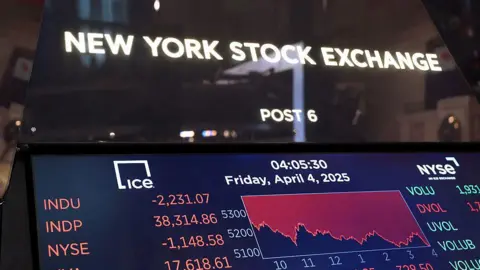What if you woke up one morning to find that the stock market was in free fall? You might have had your coffee, your socks probably don’t match, and then there’s this news on your screen—major stock indices plummeting like a skydiver who forgot their parachute. Sounds frightening, doesn’t it? Well, that’s essentially what happened recently to the US stock markets.
Setting the Scene: A Week of Turmoil
You might recall how the stock market can be an emotional roller coaster. However, the last week has been particularly brutal. Major US stock indices saw declines over 5%, marking the worst week since the dark days of the Covid crash. Yes, you read that right. When the numbers flash red across the boards, it stirs up a wide array of feelings—from panic to confusion.
What Triggered the Drop?
Wondering what could lead to such a dramatic downturn? The fears surrounding the trade war certainly aren’t helping the stability of the market. Recently, tensions escalated significantly due to China’s reaction against new tariffs imposed by President Trump. It’s the kind of drama that makes the latest reality show seem dull.
Tariff Tango: The Ups and Downs
So, what’s the deal with those tariffs? President Trump has implemented a 10% import tax on a variety of goods coming from numerous countries, which includes important global players like China and the EU. That’s the kind of news that sends shivers down the economic spine.
It isn’t just a one-way street. China has retaliated, imposing a staggering 34% import tax on US goods, making you wonder if any of us are going to get affordable holiday gifts this year. Analysts describe this situation with words like “prolonged trade war,” which should ring alarm bells for every investor and consumer alike.
Global Ripple Effects: A Worldwide Concern
The repercussions extend beyond US borders. The S&P 500 dropped nearly 6%, leading to significant losses globally. For instance, take a look at the UK FTSE 100, which experienced its largest decline in five years, plummeting almost 5%. These numbers indicate a troubling trend that can impact you no matter where you’re located.
A Dimming Economic Forecast
As if the markets crashing like a glass vase hitting the floor wasn’t alarming enough, analysts are also warning of potential recession scenarios. Yes, you read that correctly—global economic recession. The tariffs are predicted to slow down US economic growth by a remarkable two percentage points this year. So, what does that mean for you? Fewer job opportunities? Higher prices on goods? More financial uncertainty overall?

Industry-Specific Impacts: Who’s Affected?
For a moment, let’s break down how these market declines impact specific industries. Not all sectors are feeling the pain equally, and some are showing surprising resilience.
Consumer Staples and Healthcare: Holding Steady
Even amidst the storm, consumer staples and healthcare sectors felt the tremors, though not as severely as others. It’s fascinating how essential products and services, like food and health care, continue to be in demand, regardless of market woes. Imagine going to the grocery store and seeing prices climbing; that’s real!
Housing Market: A Glimmer of Hope
Now, let’s shift gears a bit. The housing market appears to show some resilience in these tumultuous times. If you’re considering buying or selling property, you might find solace in this little bubble. Even during a market downturn, people still need homes, and that can provide some relief to an otherwise chaotic financial atmosphere.
Negotiations on the Horizon
There’s a little light at the end of the tunnel—potential negotiations with other countries are reportedly in the works. However, there’s no guarantee that discussions will bring about a swift resolution. Think of it as waiting for that much-anticipated email that seems to drag on forever.
Federal Reserve’s Concerns: The Bigger Picture
The Federal Reserve is keeping a close eye on the situation. Rising prices and the uncertainty fueled by tariffs have become a cause for concern. If you’re wondering what this means for interest rates or the cost of borrowing money in the coming months, it’s worth paying attention. The decisions made today could affect your financial choices tomorrow.

What Comes Next? A Look into the Future
You might find yourself brimming with questions. What does the future hold? Are we at the mercy of politicians? Can you predict when stability will return? While only time will tell, being informed can prepare you for whatever comes next.
Stay Informed, Stay Engaged
Your best tool in times like these is information. Keeping up with the latest news and understanding market trends affords you better control over your financial decisions. Follow trusted news outlets, listen to expert opinions, but maintain a healthy skepticism.
Managing Your Investments
If you’re currently invested in the stock market, this might be a good time to revisit your portfolio. Diversifying your investments could be a smart move to mitigate risks during uncertain times. If you feel overwhelmed, consulting with a financial advisor can be a wise choice. After all, you wouldn’t approach a high rope course without a safety harness, right?
Remaining Optimistic
Despite the chaos unfolding, President Trump has urged followers to remain optimistic about the US economy, particularly touting a strong labor market. It might seem contradictory that amidst falling stocks, there’s encouragement to keep the chin up. Nevertheless, a strong job market can mean that many Americans are still working, earning, and spending. Positive economic indicators can provide hope even during bumpy periods.

The Emotional Rollercoaster of Market Fluctuations
It’s normal to feel concerned when you hear about the stock market taking a nosedive. The emotional rollercoaster that comes with investing can shake your confidence. You might find yourself grappling with fear, curiosity, or even anger. Here’s a friendly reminder to acknowledge those feelings but don’t let them dictate your actions.
Surround Yourself with a Supportive Community
Talking to fellow investors or friends who understand market fluctuations can help ease some of your anxiety. A community can offer valuable insights and support that might keep your spirits high when the numbers aren’t so kind.
Emphasizing Mental Well-Being
While navigating through turbulent financial waters, don’t overlook your mental well-being. Taking breaks from financial news, enjoying a hobby, or spending time with loved ones can make a world of difference. After all, your mental health is just as vital as your financial health.

In Conclusion: Your Next Steps
The current state of the stock market remains precarious, with fears of a prolonged trade war looming like a dark cloud. However, armed with information and a community, you can navigate these rocky waters with more confidence.
Learn to adapt, diversify, and above all, remain informed so you can make educated decisions. Uncertain economic times can be scary, but remember that the market has a way of correcting itself over time. While it might be tempting to overreact or panic, take a deep breath, consider your options, and make choices that align with your long-term financial goals.
In the midst of all this, it’s crucial to find your balance. Markets go up, markets go down, and sometimes they spin in ways that could make your head spin. Focus on what’s in your control and stay connected with the ever-changing landscape of the economy. After all, your financial future is a journey, not a sprint.
